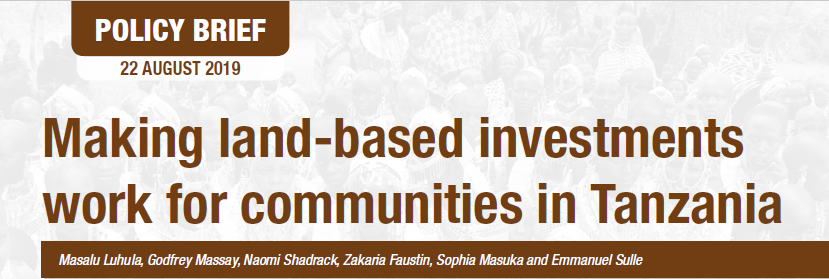Developing a Framework for African Development Bank’s Enhanced engagement with CSOs

The African Development Bank invited TNRF to serve as a panelist in a seminar aimed at strategizing and defining a way forward for effective engagement between the Bank and civil society organizations (CSOs). Specifically, TNRF was asked to share experiences and strategies on how the Bank can operationalize the framework with CSOs at project level. TNRF's Head of Programmes, Geofrey Mwanjela, served on a panel with other CSOs from across Africa (Ghana, Kenya, Benin, Cameroon, Tunis, South Africa), and participated in discussions that ranged from issues of natural resources, human rights, gender, and education to agriculture. The Bank's senior staff, including the first Vice President, participated in the discussions.
Issues covered at the meeting
In general, the discussions during the panel were centered around emerging issues that impact natural resources and specifically the recent wave of land and investment challenges and the impending threats and impacts of climate change.
- Improving transparency and accountability
The focus for the Bank for more transparency and accountability is within the general paradigm shift in many multilateral organs (e.g. WB, IMF and AfDB) for the past few decades. In the past, the Bank supported projects that were more focused on unilateral relations with governments without including other stakeholders.
- Member country political dynamics
Although the Bank is pushing to work with CSOs across Africa, this decision in some countries is contrary to the move - the lack of democracy in some countries is hindering CSOs participation and hence citizens voices; lack of policies and mechanisms for rights to access public information; and lack of mechanisms for generating evidence based advocacy information within CSOs. In line with these issues, the land based investment experiences in Tanzania was shared with the group and agreed as good example for CSOs across Africa to follow.
- Recommendation to the action plan for the framework
As a way of moving forward with the framework - TNRF recommended that
- The bank should conduct stakeholder mapping (CBOs, CSOs and NGOs) in partner countries within respective sectors;
- Public review and dissemination of environmental assessments (e.g., EIAs and SEAs) to the public and CSOs but this will depend on each country policies and laws;
- Work with CSOs to provide platform for sharing best practices on similar projects in order to address smart/sustainable investments; support projects in partner countries that are pro-poor;
- Engage with CSOs in full project cycles through constant information sharing and field visit. Examples of human abuse, environmental destruction were cited in countries such as Tanzania and Zambia
- Challenges to operationalizing the framework
There were some challenges cited for operationalizing the framework at project level and these include:
- Lack of information sharing among CSOs in some countries
- CSOs-government weak relations in some countries
- Lack of effective dialogue mechanism among CSOs, between the Bank and CSOs at country level
- Weak collaboration between Bank's field offices and CSOs in partner countries.
- Weak expertise within CSOs on issues of natural resources governance, investment etc.

